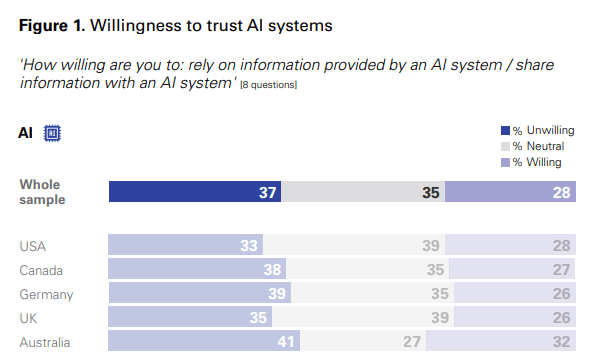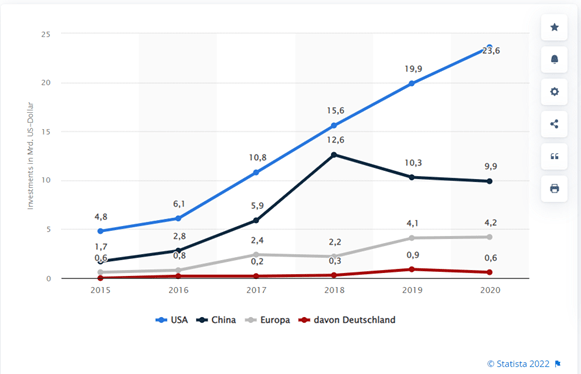Is Germany too Sceptical for Artificial Intelligence in the Workplace?

Please enter your Email address
There is a prejudice that the working world in Germany is mainly fearful and skeptical of a future with artificial intelligence. Is that really a prejudice or a fact?
Are you familiar with the term “German Angst”? It describes the fact that people in Germany are very reserved and sceptical about change. Misgivings often characterize our actions, and since the term is used internationally, this “fear of change” is perceived to be much more pronounced in our nation than in other countries.
The term “German Angst” also comes up again and again in specialist discussions about the development and use of artificial intelligence (AI) in the world of work. There is a prejudice that Germany approaches a future with AI mainly with fear and scepticism. AI visionaries and startups look longingly across the ocean toward the US because its attitudes seem more liberal, innovation-friendly and, not least, more spendy.
So, how does it look? Is the term “German Angst” rightly used concerning artificial intelligence?
German Angst and AI: Fear of Exactly What?
What does “German Angst” involve in AI?
Concerns about AI applications are manifold. At this point, we will disregard dystopian scenarios, such as machines taking over world domination. Anyone who studies AI a bit knows that such future versions are not realistic with the AI applications that exist today and fall into the realm of science fiction. But there are fears that we take seriously:
Fear of job losses, data abuse, heavy work monitoring, and a general lack of trust in such programs.
On all of these points, there are already extensive expert discussions (especially in the area of “AI and ethics“), studies, and regulations that address these fears. We, too, have written some posts about the fear of job losses due to AI. After all, the benefits of AI in the workplace are undeniable, and it is in the interest of industrial progress to enable the use of AI applications in a safe way.
Such a “powerful” technology always brings legitimate concerns that should be heard and discussed. But only in Germany? Doesn’t that apply to all other countries as well?
“German Angst” – Prejudice or Fact?
This article is not primarily about the opportunities and possible dangers of AI. Instead, it concerns whether Germany has “more” fear than other countries.
German Angst” is mainly about the population’s mood regarding changes – in this case – due to the use and development of AI.
And the fact is, no empiricism proves an increased “fear of AI in Germany” compared to other countries! Rather the opposite. We don’t particularly stand out overall – I would say we are in the “solid middle”.
The “Trust in Artificial Intelligence Report 2021” by KPMG examines the trust and expectations in artificial intelligence of citizens from the USA, Canada, Australia, UK and Germany. The report is linked below in the bibliography. It asked about trust or distrust in many areas where AI is applied. Germany does not particularly stand out in any way. There is very little difference between the countries’ data. This image shows the first and most generic question about trust in AI in general.

Authors Kai Arne Gondlach and Michaela Regneri also write the following in their paper titled “The Specter of German Angst”:
“Masses of frightened, technophobic adults are often encountered in movies, but not in social reality. A study by the IT service provider Adesso SE (Adesso, 2020) confirmed that. Three-quarters of the respondents were explicitly not afraid of AI and have a carefree view of the technological future.”
In other words, there are both distrustful and sceptical people and those who believe in this technology. In Germany, just as in other countries. So much for the “mood among the population.”
How is Germany Doing in the Use of and Investment in AI?
So the “German fear of AI” has not come true. However, you cannot deny that Germany does not hold a top position in the actual “doing”. We are far behind in an international comparison of investments in startups in artificial intelligence, as the chart from Statista from 2021 shows.

The USA also dominates among AI companies. Of 4,998 companies internationally that have integrated AI into their business model, 40% are US companies, with an upward trend. The same applies to AI startups: The USA also leads with 1,393 (40% of all global AI startups).
And Germany is well aware of this situation. We know that AI is a promising technology for the future. And we also know that we have catch-up potential in an international comparison. A Bitkom study shows that so far only 8% of companies in Germany actually use AI applications in their day-to-day work. However, every 4th company wants to invest in AI.
Germany, Why so Hesitant?
In this section, I can only speculate. There are probably many different factors at play here.
As the opinion polls above show, there is no “German fear of AI”. However, according to Ulrich Kerzel (2021, study author at the IUBH Erfurt), “the myth of German Angst” could create a kind of “fear of fear” in Germany:
“Fear of AI is dangerously overestimated in Germany. If managers assume that employees are sceptical about AI, this makes it more difficult to decide in favour of artificial intelligence. Thus, fear of fear becomes a drag – and
leads to companies not realizing the enormous potential of AI.”
What do you think, could that be part of the reason for the hesitancy in Germany? I don’t know. However, I’m sure it’s not the only reason. That shows a Bitkom survey from 2021, where companies give very pragmatic reasons for “not getting involved” with AI:
Lack of personnel (49%), lack of time (47%) and lack of money (46%). Oh well, who doesn’t lack all that?
In addition, 44% of the companies want to wait and see how other companies are doing with this AI. I’ll admit it; this was worded more seriously in the study: “44 per cent want to wait and see where AI use proves useful in other companies first.”
Astonishingly, the use of AI fails only very rarely due to a lack of a use case in the company (17%). And this reason is the only understandable one for me personally.
CALCULATE NOW THE ROI OF QYMATIX PREDICTIVE SALES SOFTWARE
Is Germany too Sceptical for Artificial Intelligence? – Conclusion.
In opinion polls on artificial intelligence, German companies see enormous potential. The German population is also not “too sceptical”, and we are not disproportionately afraid of AI compared to other countries.
However, you can not see this in the actual implementation of AI in the German workplace.
Germany talks about AI’s innovative power and importance and plans to be a future leader in this field. Plans upon plans. But as John Lennon said so well, “Life is what happens while you are busily making plans”.
So, my appeal to the companies and investors of Germany: have you found a case for artificial intelligence and thought it through well? Then don’t plan it for another year – go for it! Some time and somewhere, the beginning has to be made. And then great things will happen.
I WANT PREDICTIVE ANALYTICS FOR B2B SALES.
Further Read (German language):
Inka Knappertsbusch & Kai Gondlach (2021): Arbeitswelt und KI 2030. Hg.: Springer Link.
Kratochwill, L. et. al. (2020): Globale Trends der künstlichen Intelligenz und deren Implikationen, Hg: Deutsche Energie-Agentur GmbH, S.40.
Bitkom (2021): Künstliche Intelligenz kommt in Unternehmen allmählich voran.
KPMG (2021): Trust in Artificial Intelligence: A five country study.
Focus Online (2017): Was bedeutet der Ausdruck “German Angst”?
Speck, A. (2020): KI zwischen Zuspruch und Skepsis. Hg.: Springer Professional